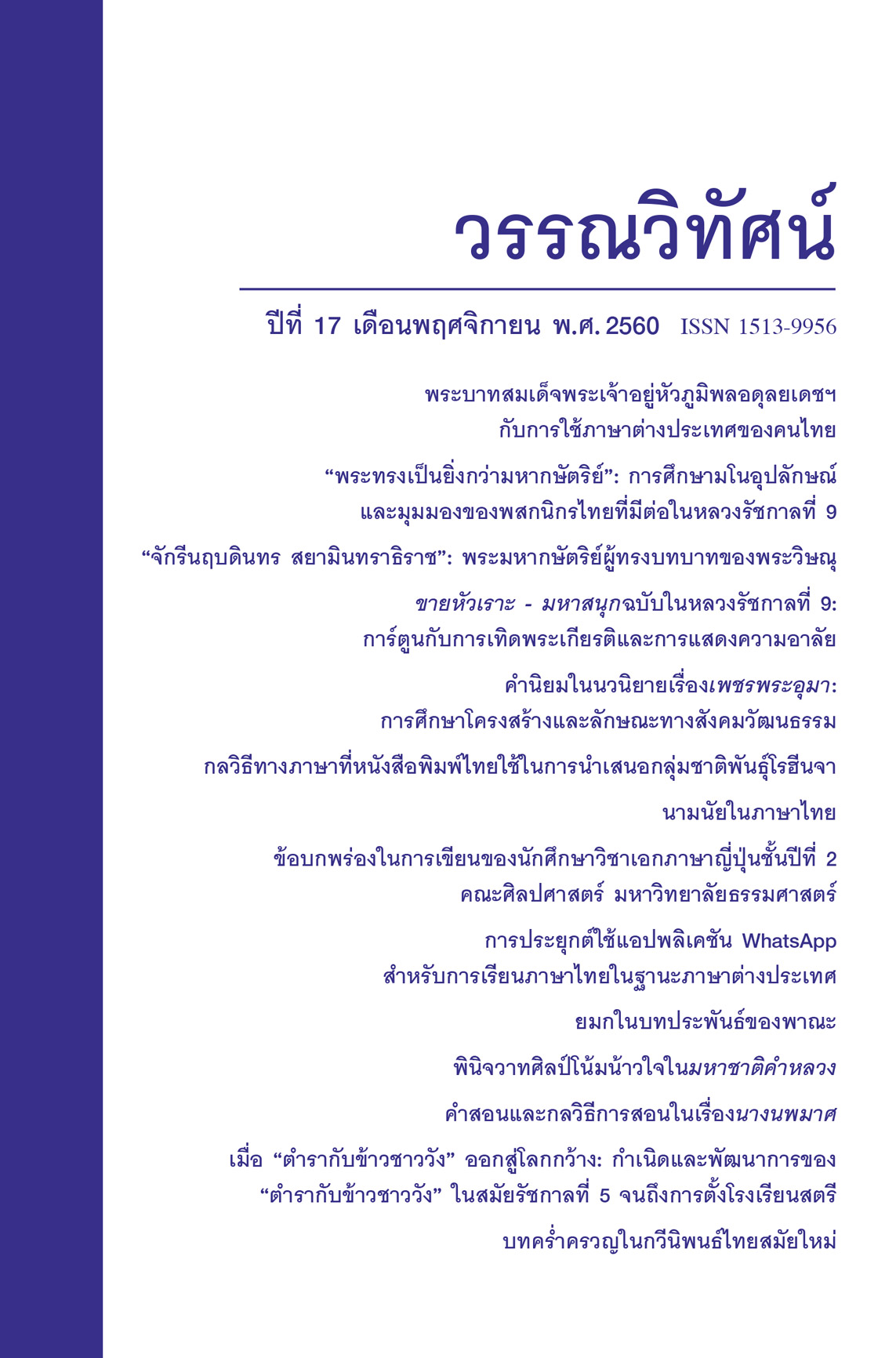การประยุกต์ใช้แอปพลิเคชัน WhatsApp สำหรับการเรียนภาษาไทยในฐานะภาษาต่างประเทศ
Main Article Content
บทคัดย่อ
บทความนี้มีวัตถุประสงค์เพื่อนำเสนอแนวทางการประยุกต์ใช้แอปพลิเคชันส่งข้อความ (Messaging application) สำหรับการเรียนภาษาไทยในฐานะที่เป็นภาษาต่างประเทศ กลุ่มตัวอย่างเป็นนักศึกษาระดับปริญญาตรีของมหาวิทยาลัยเทคโนโลยีนันยาง (Nanyang Technological University) ประเทศสิงคโปร์ ซึ่งลงทะเบียนเรียนวิชาภาษาไทยในระดับพื้นฐาน จำนวน 38 คน
ลักษณะของการจัดกิจกรรมเป็นการมุ่งให้นักศึกษาได้ฝึกภาษานอกห้องเรียน โดยเน้นทักษะด้านการฟังและการพูด ผู้เรียนจะต้องจับคู่กันเพื่อฝึกถามและตอบโดยการส่งข้อความเสียงผ่านแอปพลิเคชัน WhatsApp คู่สนทนาจะมีทั้งผู้เรียนที่เรียนอยู่ในระดับเดียวกันและระดับที่สูงกว่า หลังจากเสร็จสิ้นการสนทนา ผู้เรียนต้องส่งแบบฟอร์มคำถามซึ่งได้บันทึกคำตอบแล้วและส่งไฟล์เสียงที่ได้สนทนากันมาให้ผู้สอนตรวจสอบความถูกต้องในด้านต่างๆ เช่น การออกเสียง ความเหมาะสมในการใช้ภาษา และไวยากรณ์ ผลจากการจัดกิจกรรมพบว่าผู้เรียนร้อยละ 95 มีความพึงพอใจต่อกิจกรรมนี้ และแนะนำให้มีกิจกรรมนี้อีกในอนาคต
Article Details
เอกสารอ้างอิง
Apple App Store. (2015). Messaging Applications | Comparison. Retrieve March 15, 2016, from www.appstore.com
Appel, R. & Muysken, P. (1987). Language Contact and Bilingualism. Amsterdam: Amsterdam University Press.
Amry, A. B. (2014). The Impact of WhatsApp Mobile Social Learning on the Achievement and Attitudes of Female Students Compared with Face to Face Learning in the Classroom. European Scientific Journal, 10(22), pp. 116–136.
Bansal, D. & Dhananjay Joshi, T. (2014). A Study of Students Experiences of WhatsApp Mobile Learning. Global Journal of Human-Social Science Research, 14(4), 26–33.
Castrillo, M.D., Bárcena, E. & Martín-Monje, E. (2014). New Forms of Negotiating Meaning on the Move: the Use of Mobile-Based Chatting for Foreign Language Distance Learning. IADIS International Journal on WWW/Internet, 12(2), 51–67.
Centre for Modern Languages. (2015). Thai Language Programme. Retrieve March 15, 2016, from http://cml.hss.ntu.edu.sg/Programmes/Thai/Pages/Home.aspx
Gutiérrez-Colon et al. (2013). Improving learners’ reading skills through instant short messages: a sample study using WhatsApp. Proceedings of WorldCALL 2013 - CALL: Sustainability and Computer-Assisted Language Learning, Glasgow. 10–13 July 2013.
Liu, Zhongwen. (2014). A Study on the Application of WeChat in ESP Training. Theory and Practice in Language Studies, 4(12), 2549–2554.
Statista. (2016). Penetration of leading social networks in Singapore as of 4th quarter 2015. Retrieve March 15, 2016, from http://www.statista.com/statistics/284466/singapore-social-network-penetration/
WhatsApp. (2016). WhatsApp Blog. Retrieve March 15, 2016, from https://blog.whatsapp.com/616/One-billion
Yang et al. (2012). Voice over Instant Messaging as a Tool for Enhancing the Oral Proficiency and Motivation of English-as-a-Foreign-Language Learners. British Journal of Educational Technology, 43(3), 448–464.


